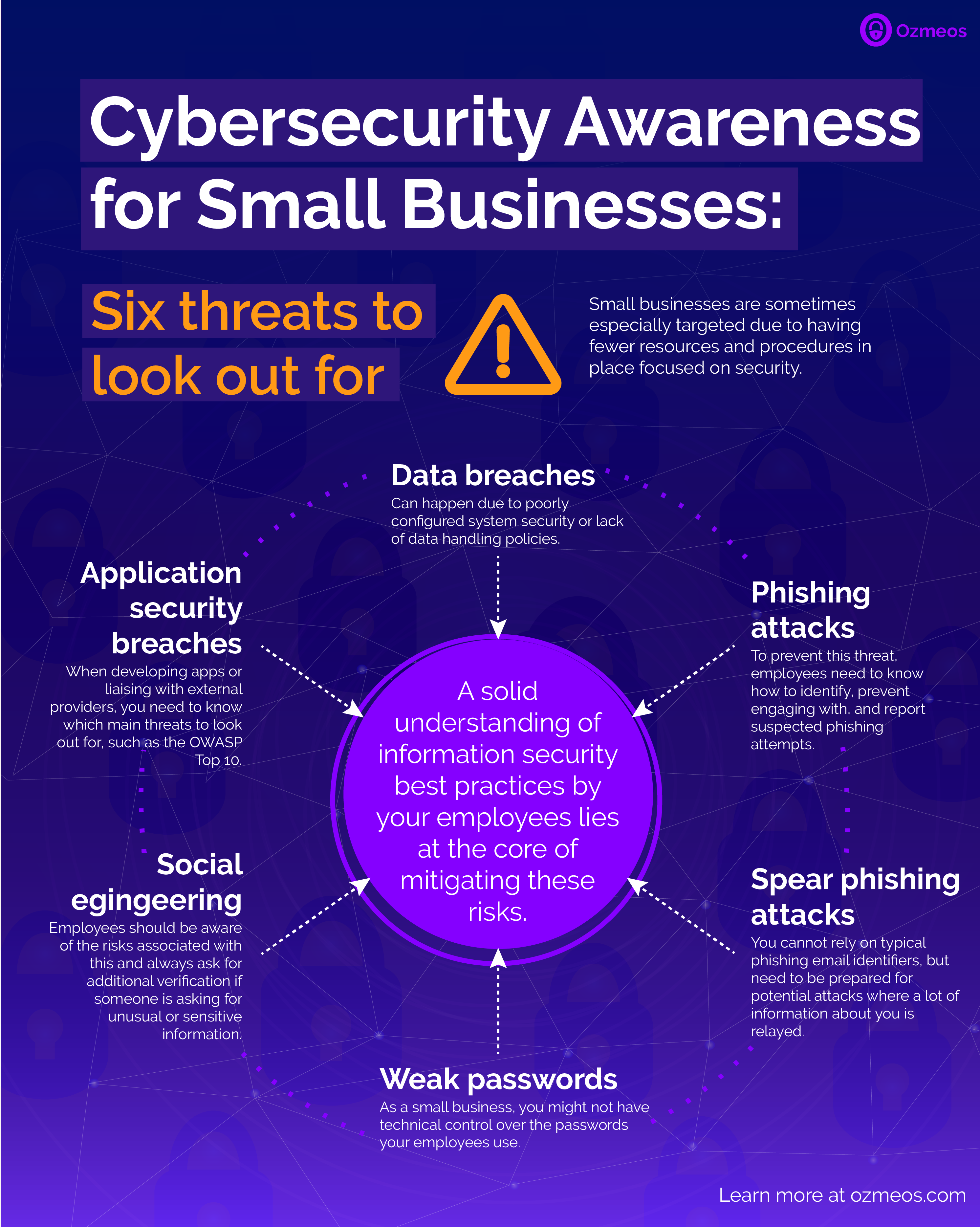
Cybersecurity Awareness for Small Businesses – Six Top Tips
This article goes over why even small businesses should have proper cybersecurity training and awareness plans in place.
Even small businesses can be targeted by cyber threats, and in some cases, small businesses are especially targeted. No matter the size of your organization, it is crucial that all employees have a sound understanding of information security best practices. Employees should understand the basics of cybersecurity to recognise potential risks and actively participate in safeguarding sensitive information. In this article, we will go over some of the main threats and how small businesses in particular might be vulnerable to them.

1. Data breaches
A data breach happens when an unauthorised party gets access to your sensitive data or confidential information. For small businesses, this can happen due to poorly configured system security or fewer policies concerning e.g. the transportation of IT devices or corporate credit cards. Whether from the incorrect disposal of a used computer equipment or a stolen credit card, these kinds of breaches can be costly. The consequences of a data breach not only involve the direct financial costs in remediation, but also the indirect costs of reputational damages, operational disruption, or legal consequences. Because of this, staff at small businesses should take extra precautions when handling business information, and remain aware that they are not invisible to attackers purely because of the small size of the firm.
2. Phishing attacks
Phishing attacks involve the use of deceptive emails, messages, or websites to trick individuals into revealing sensitive information like passwords or financial details. Cybercriminals are effectively leveraging AI tools, and phishing messages are now often incredibly convincing. Although your small-business domain might not yet be on the radar of cybercriminals, this will only mean that any phishing emails you receive will be all the more unexpected. Phishing attacks can cause harm in various ways, ranging from harvesting your log-in credentials through a fake website to injecting malware onto your device through a clicked link. To prevent this threat, employees need to know how to identify, prevent engaging with, and report, suspected phishing attempts.
3. Spear phishing attacks
Due to the fact that you may be less well-read on cybersecurity as a small business, cybercriminals may target you specifically through something called spear phishing. Spear phishing is a targeted phishing attack that uses personalised emails to trick you into believing they are legitimate. It often leverages personal information that has been researched about you prior to engaging with you. Although these attacks generally target executives, people in financial departments or people with access to sensitive data, they could be done to anyone, and it is good for all employees to be aware of it. What this means is that you cannot rely on typical phishing email identifiers, but that you need to be prepared for potential attacks where a lot of information about you is relayed.
4. Weak passwords
As a small business, you might not have technical control over the passwords your employees use. Because of this, your systems face a risk when it comes to hackers gaining access to due exploiting insecure or easily guessable passwords. To reduce this risk, your employees need to understand proper password hygiene as well as the potential risks that may come from someone breaching your systems due to a cracked password.
5. Social engineering attacks
Although you might know all your colleagues personally in your small business, and therefore might be less likely to believe that a cybercriminal contacting you attempting to impersonate your manager is actually your manager, social engineering attempts can still happen. They could take place in the form of someone impersonating an external contact, such as a previous customer or vendor who have had their accounts hacked. Employees should be aware of the risks associated with this and always ask for additional verification if someone is asking for unusual sensitive information.
6. Application security breaches
One of the technical risks for smaller businesses is that their applications may not be sufficiently configured for security. Whether you develop your own applications or not, you need to know which main threats to look out for and/or what to ask your providers that they have checked for, such as the OWASP Top 10.
So do small businesses need cybersecurity awareness?
To conclude, small businesses are just as vulnerable as larger companies in terms of cybersecurity risks. In fact, there may be additional risks largely due to limited resources and fewer security policies in place. However, there are ways to generate a sufficient security awareness amongst your employees to ensure people act with information security in mind on a daily basis.